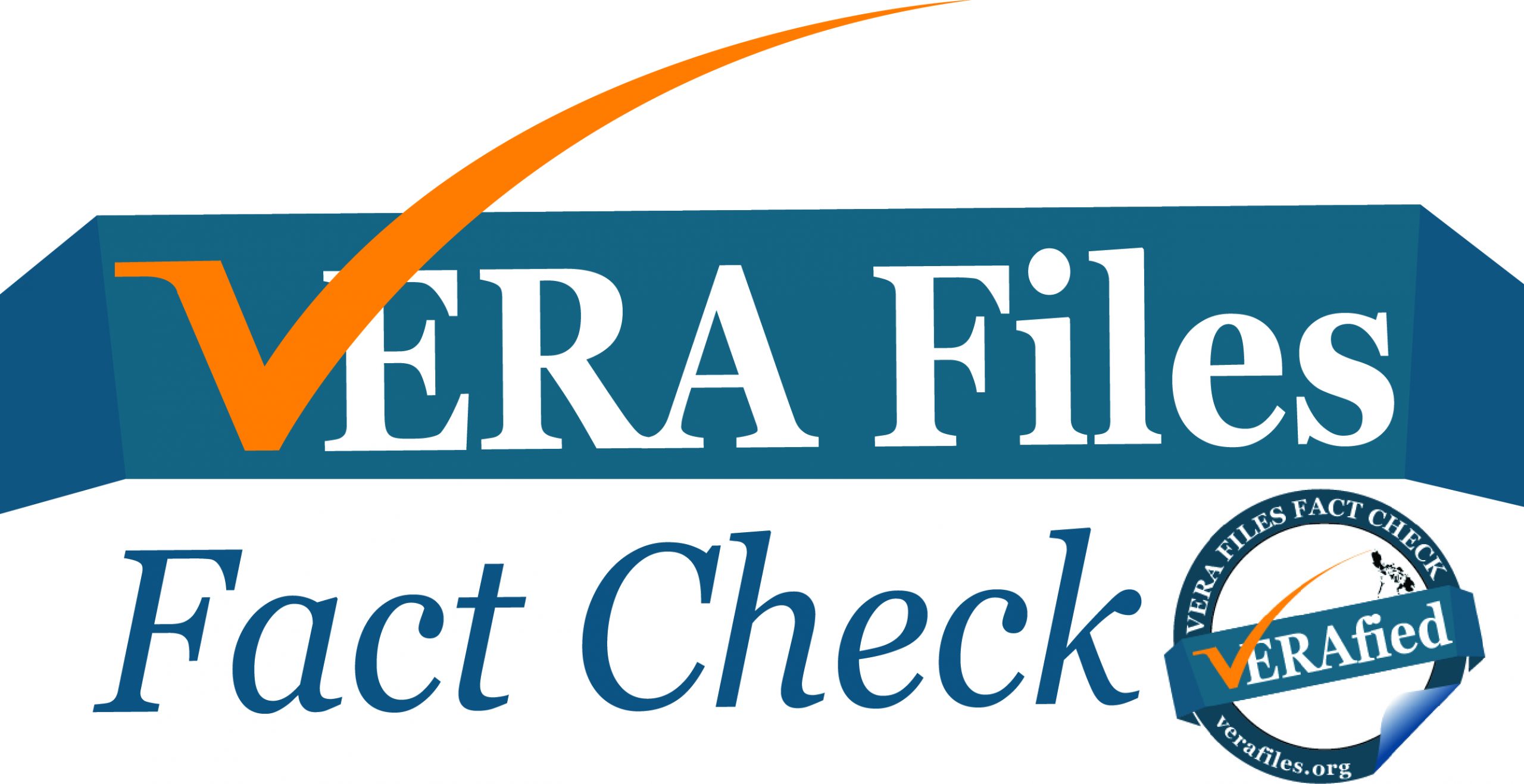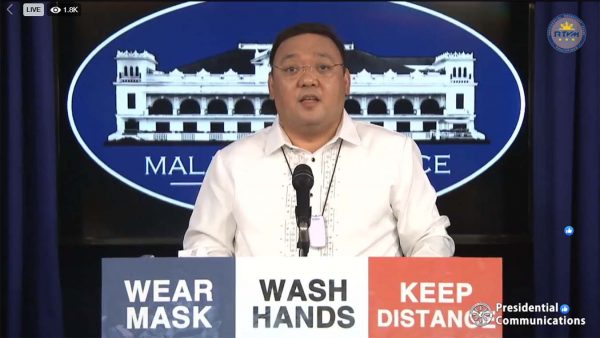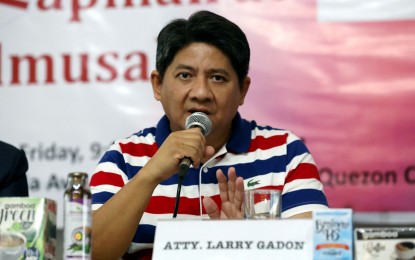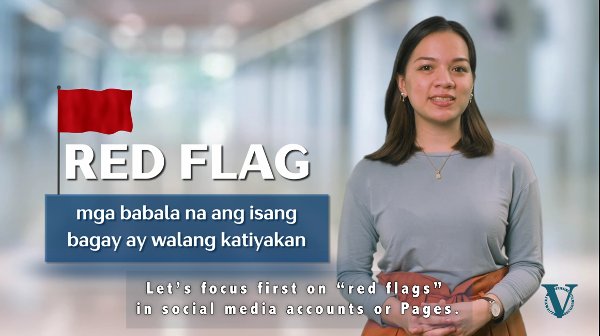Update: November 8, 2025
What is VERA Files Fact Check?
VERA Files Fact Check tracks false claims, flip-flops and misleading statements of public officials and figures and debunks them with factual evidence. It also debunks misinformation and disinformation spread on the internet through websites and social media.
Why fact-check?
In order that the citizens can meaningfully participate in governance, which is what democracy is, they should be empowered with accurate information. Social media has democratized information distribution, which is good. However, it has also been used by malevolent elements to spread lies and falsehoods which create confusion among the citizens and undermine their ability to make informed decisions.
As journalists, we at VERA Files are committed to seeking and telling the truth. Fact-checking is one of the means. We believe in accountability journalism, which is essential to a functioning democracy.
Note: Public figures include former and current government officials, electoral candidates, leaders of political parties, partylists and political coalitions, journalists, experts, and key opinion leaders, including celebrities and online influencers (i.e. bloggers and vloggers).
How did VERA Files Fact Check begin?
It started during the 2016 presidential elections as a class activity of VERA Files cofounder and then trustee Yvonne T. Chua at the University of the Philippines where she teaches journalism. Chua’s students fact-checked statements made by candidates for national positions, applying guidelines used by fact-checkers in other parts of the world. She and VERA Files writer Jake Soriano worked closely on the activity and posted the output in VERA Files under the “Is that so?” section. “Is that so?” became “VERA Files Fact Check” in July that year. Chua led VERA Files Fact Check until Jan. 31, 2019.
How do you select claims to fact-check?
We fact-check claims based on a three-point criteria. We ask ourselves the following questions:
Is it a statement of fact?
A fact-checkable claim is one that is categorically claimed to be a fact. VERA Files does not fact-check opinion.
Is it feasible?
A fact-checkable claim is one that can be disproved or given context to using readily available government records, documents, journal articles, or expert interviews, among others.
Is it relevant?
We fact check claims that are of public interest — anything that may affect the welfare of the general public.
For online disinformation, we add another layer to our criteria: virality. We prioritize verifying content that is reaching high numbers of people or is being published by multiple accounts on social media platforms.
How do you fact-check?
Here’s the process:
Step 1: The team monitors press conferences, speeches, events, statements, interviews etc. for statements worth fact-checking.
Step 2: One team member is assigned to research and verify the “suspicious” claim or statement. He or she looks for multiple sources to do one or two of the following: (1) dispute or corroborate the claim, (2) use these for the backstory, or (3) collect as proof that there was a flip-flop. Other team members may be assigned to help in the research.
Step 3: The team member writes and shares his or her findings with the entire team.
Step 4: The other team members weigh in. They perform additional fact-checking and first-editing, as needed.
Step 5: Infographics or videos are prepared to go with the item, as needed.
Step 6: One to two senior editors finalize and sign off on the article before it is posted.
VERA Files released in March 2018 an online guide: VERAfied: A DIY guide to fact checking and fighting fake news.
The team holds regular meetings to brainstorm, propose stories, and challenge pitches or findings.
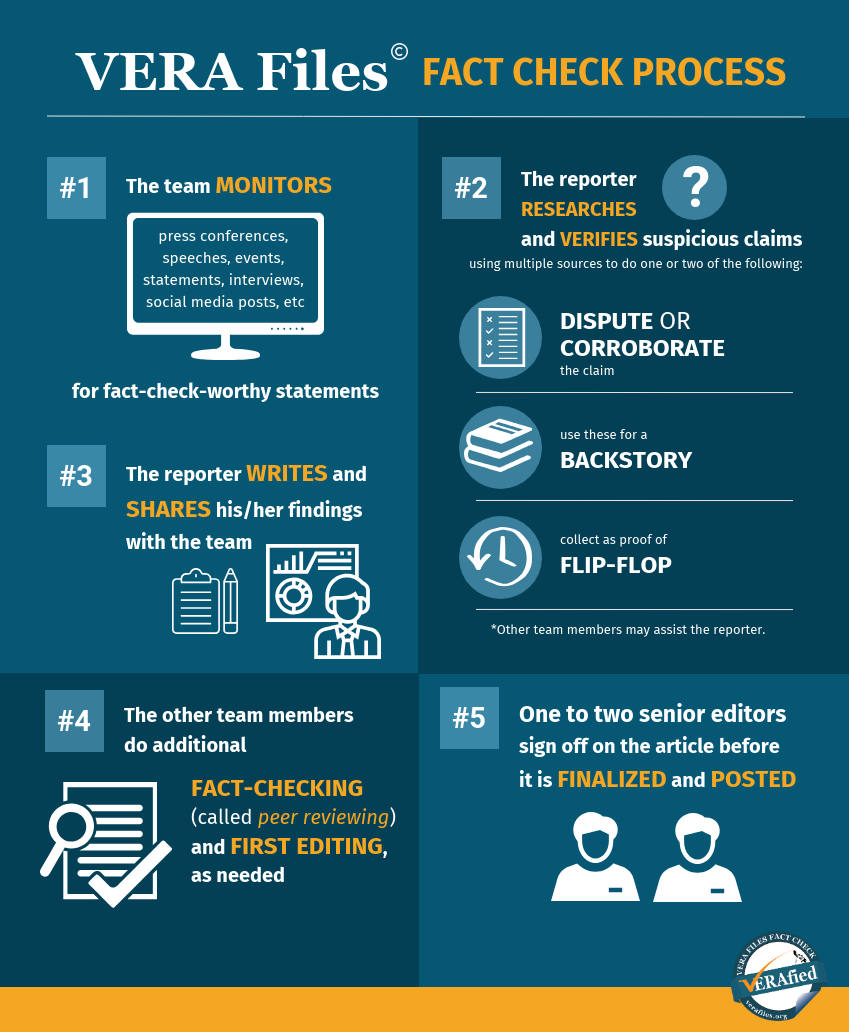
What are some of our do’s and don’ts when fact-checking?
These are a few things that are strictly observed when we fact-check:
- The statement being fact-checked has to be firsthand. We look for the press release, press statement, transcript of an interview, audio or video that holds the statement.
- If the statement can’t be found except in a news accounts, the news reports must be cross-checked against one another to ensure consistency. We follow a three-source policy: At least three media networks must have used the same quote, or reported the statement or claim.
- We use primary sources to provide the evidence. We shy away from secondary sources, including news accounts, unless triangulation is possible.
- In the spirit of transparency, we provide the links to the sources of the statement and the evidence that are presented in the article. Sources used in infographics and videos are also prominently featured.
Where do you post your results?
We post them first in the microsite VERA Files Fact Check. But we also have Facebook posts and tweets that link to the original piece.
Who does the fact-checking at VERA Files?
Fact checking requires thorough research and analysis. It’s a team effort. The following comprise the team of reporters and editors. who all have journalism background and perform both reporting and editing work. Click their names to read their bios.
- Ellen Tordesillas
- Booma Cruz
- Chi Liquicia
- Tita Valderama
- Theresa Martelino-Reyes
- Charmaine Deogracias
- Elma M. Sandoval
- Celine Isabelle Samson
- Bryan Manalang
- Valerie Joyce Nuval
- Rhoanne De Guzman
- Vincent Galaura
What does your organizational structure look like?
Board of Trustees
Members of the Board serve as the senior decision makers of the organization.
Project managers
Project managers, or project leads, are in charge of the workflow of their respective fact-checking teams and of ensuring that deadlines and the required volume of output are met.
There are currently two project managers leading the programs under VERA Files Fact Check: one for the fact checking of public figures supported by the National Endowment for Democracy, and another for the third-party fact checking partnership with Facebook.
Senior editors
They do the final check and sign off on all fact check drafts before publication.
Peer editors
Peer editors or peer reviewers do the first editing on all fact check drafts, replicating the fact-checking process of the reporter and doing additional verification as needed.
Reporters and researchers
They monitor, research, and verify “suspicious” claims using multiple sources to do one or two of the following: dispute or corroborate; use for a backstory; or collect as proof for a flip-flop.
Why are there no bylines?
As our process demonstrates, fact-checking is collaborative. It’s a team effort. So the whole team is accountable for the entries.
Do you follow any standards when fact-checking?
We are guided by the code of principles of the International Fact-Checking Network at Poynter, a global alliance of fact-checkers committed to advance accountability journalism.
As a news media organization, we strictly adhere to the professional and ethical standards set for journalists such as those found in the Society of Professional Journalists and the Philippine Journalists Code of Ethics. These include accuracy, fairness, balance, independence, accountability and transparency. That’s not only for the fact-checking initiative but applies to the gamut of our work at VERA Files.
How sure are we that you’re not backed by a politician or political party?
VERA Files is a nonstock, nonprofit media organization that values its journalistic autonomy. We don’t take money from politicians, political parties or partisan groups. The trustees and staff members have to stay strictly nonpartisan and aren’t allowed political affiliations. They don’t take on memberships, projects and activities that will compromise their independence and result in conflict of interest situations, whether real or perceived.
What hashtags do you use for your fact-check?
We use three: #factcheckPH, #verafilesfactcheck and #verafiedPH.
Do you accept leads or contributions for your fact-checking initiative?
Certainly. VERA Files believes everybody can and should be a fact checker. We’re pleased to say we’ve produced several fact checks based on mis- and disinformation flagged by our readers.
You can send photos, videos, links or questions to the VERA Files team for free through our Misinformation Tip Line (VERA, the Truth Bot) on Facebook Messenger here.
What will happen to tips that I send?
Our reporters will look into your message and let you know if the tip is eligible for verification. If it is, VERA, the Truth Bot, will send you the fact check on Messenger once it’s published.
Find out more on how the truth both works here.
What if the fact-check team makes a mistake?
Do call our attention right away by emailing us at appeals@verafiles.org. Please send us a link to the Fact Check article in question with a short explanation of what you believe needs to be corrected.
We aim to reply to correction appeals within 24 hours upon notification. We correct substantive errors in our reports flagged both by readers, as well as the VERA Files fact check team itself post-publication. We insert corrections in the original text with an accompanying editor’s note.
If you believe VERA Files is in violation of the IFCN Code of Principles and wish to contact IFCN directly, you can visit the link https://ifcncodeofprinciples.poynter.org/complaints-policy.


